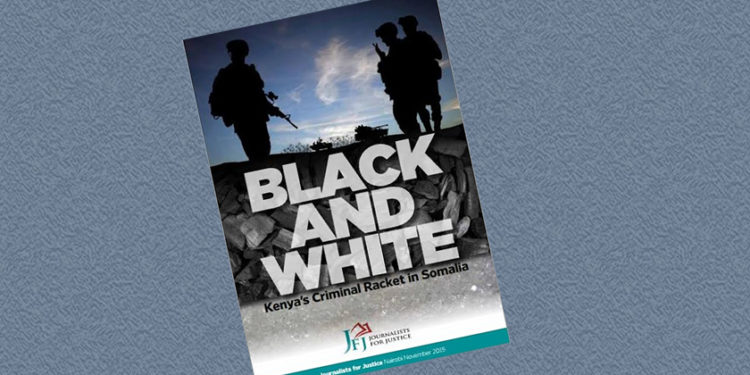Questions are emerging about exactly what the Kenya military is doing in Somalia after the emergence of fresh and detailed evidence of its involvement in the export of charcoal from the port of Kismayo and smuggling of sugar into Kenya.
Journalists for Justice Report, Black and White: Kenya’s Criminal Racket in Somalia, details the involvement of senior military officials in the illicit export of charcoal and import of sugar, trades in which the terror group al-Shabaab is also a beneficiary.
Rather than taking the fight to al-Shabaab, the Kenya Defence Forces, who were re-hatted under the African Mission in Somalia (AMISOM) after the capture of Kismayo, are sitting in bases while senior commanders are engaged in corrupt business practices with the Jubaland administration and al-Shabaab.
Residents of Kismayo said of the KDF, “They do minimal patrols, they just stay in their base; they are concerned only with the operations at the port.” A former UN official added: “The KDF in Somalia are purely in garrison mode.”
The report also audits 11 airstrikes by the KDF and finds that contrary to government claims of al-Shabaab targets destroyed, dozens of victims recount the targeting of civilian villages, water-points and livestock.
High ranking military officials with connections to powerful politicians are estimated to collect up to Sh5 billion ($50 million) a year in illicit taxes on charcoal and sugar.
Related Articles:
- Report: Kenyan Military “In Business” with Al-Shabab
- KDF in Sh41 billion illegal sugar, charcoal trade with al Shabaab – report
- Report implicates Kenyan military in sugar smuggling racket in Somalia
- Kenya army involved in sugar smuggling racket: report
- Kenyan army implicated in Somalia’s illicit sugar trade
- Report implicates KDF in sugar smuggling in Somalia
- Kenya army involved in sugar smuggling racket: report
A bag of charcoal leaving the port fetches Sh200 ($2) for the KDF network while a bag of sugar unloaded also attracts a Sh200 ($2) in taxes. In its 2014 report, the UN monitoring group found the port duty on a 25kg sack of charcoal was $3 per 25kg. Of this tax, the KDF network takes $2, with the balance divided between Jubaland and al-Shabaab.
Once sugar brought back by returning charcoal ships, it is unloaded at a Sh200 ($2) tax for the KDF network before being transported through territory controlled by Al-Shabaab and the Jubaland government. Al-Shabaab levies a $1,050 tax on an estimated 230 trucks leaving Kismayo for Kenya each week.
One diplomat quoted in the report described the illicit trade in sugar and charcoal as “shocking” and, “inimical to national security”.
Diplomatic sources revealed that Kenya’s allies in the fight against al-Shabaab, in particular the United Nations, the United States and the United Kingdom, were “very frustrated” with KDF’s activities, which are facilitating al-Shabaab’s financing.
Western diplomats have made private representations to the Kenyan government on the matter but they cannot force the issue, they said, because US and European forces need KDF’s cooperation in the region.
The emergent picture of Kenya’s involvement in Somalia, says the report, appears to be directly opposed to AMISOM’s mandate to neutralise armed groups, support the federal government and disrupt terrorist financing. The corruption and human rights abuses undermine Kenya’s goals in Somalia, provide funds and propaganda to al-Shabaab.
The report calls for the investigation and removal of top KDF officials involved in the racket and a shutdown of all smuggling. It also recommends a wide-ranging investigation by the Kenya National Commission on Human Rights, the United Nations Commissioner for Human Rights and the UN monitoring group for Somalia and Eritrea.







